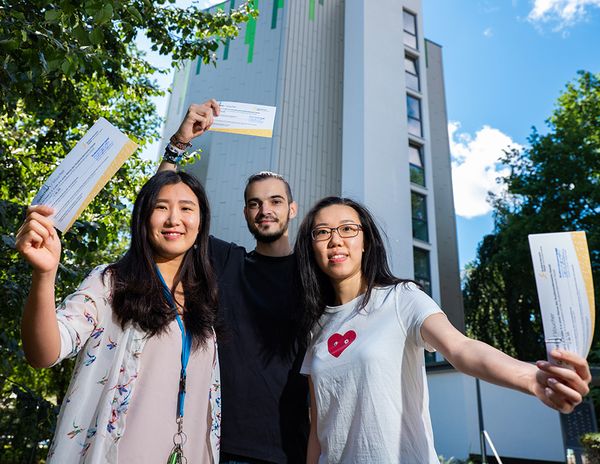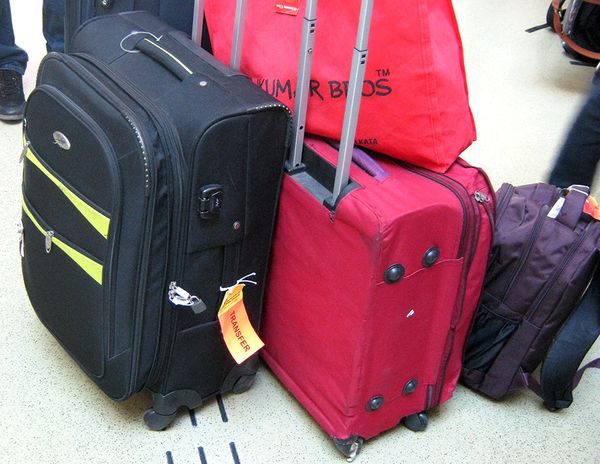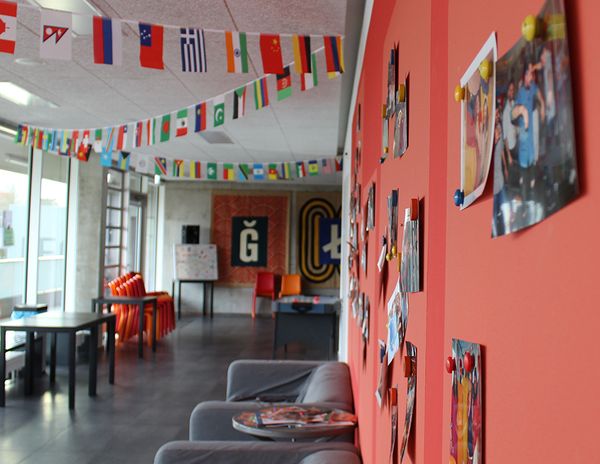[Translate to Englisch:] Themenmonat 03 Internationales
März - Internationales
Cosmopolitan Campus
Whether Bologna, Prague, or Paris - already when the first universities in Europe were founded, the claim was formulated to represent the totality of all sciences (universitas = the whole). Not least this pioneering approach makes universities international centers of attraction. Already in the Middle Ages, students from all parts of Europe came together. Until today, students from all around the world meet - the international claim is unbroken, the tendency constantly increasing - also here in Kassel.
- Mensa goes international
- Yazan tells...
- Interview with Mike Pillardy, Social Advisor at the Studierendenwerk
- The Origins in Witzenhausen
- Where should Erasmus live?
- The International House
- International Networking and Cultural Offerings
- CampusClub for students from all over the world
- Internationalization progresses
Mensa goes international
The world has so many fantastic recipes and so many culinary specialties to offer - so it's no wonder that on a cosmopolitan campus, Mensa menus are also international. Even during Pandemic, and especially during our international theme month, exotic spices are simply part of the package. The Zentralmensa and Mensa Heinrich-Plett-Strasse, that are open now, are also bringing global diversity to the plates. In the video, the Zentralmensa team shows how an international menu is created and implemented. From reading the cookbooks to ordering the food and preparing the dishes. Don't you think you can almost smell the fragrant spices?
Yazan tells..
… about his way to come to Germany as an international student. Starting with the decision to leave his home country at the age of 17 and study abroad, through the challenge of applying for a visa, opening a blocked account, applying to the University of Kassel, and finally applying for a student hall. 18 months later, he finally moves to Germany with a visa and a place to study in his pocket.
Yazan studies computer science at the University of Kassel and is a tutor for the student halls Moritzstraße and Mönchebergstraße in Kassel.
Audio in German Language only. Therefore, we have prepared a translation into English written language:
"When I was in high school, my father informed me that I had the opportunity to study abroad after graduating from high school. I was to choose between three different countries: Germany, Russia, and Great Britain. After extensive research, I decided to study in Germany. Shortly after my high school graduation and before I even got the exam results, I started learning German. This was an important requirement to apply for the visa. The first hurdle I had to clear was admission to the university. The application procedures at the various universities were different. And the information on the homepages of the universities was very well hidden. It took me a lot of time to gather the information at that time. The communication with the admission offices at the universities went quite well. The staff there were very nice and friendly - they tried to explain everything to me. The second hurdle I encountered was opening a blocked account. As almost always, the information on the banks' homepages was very well hidden. The problem was: one should be registered in Germany to open a blocked account. But, to get a visa, you have to have a blocked account. After an eternal and intensive research, I found a bank where I could open the blocked account. After I finally had all the required documents for the visa application together, I requested an appointment. The appointment at the German Embassy went very well. I was very surprised that the clerk for my application spoke fluent and accent-free Arabic. She was very friendly and said I had a good chance of getting the visa. After less than 40 days I got the approval for the visa. After I arrived in Germany, I studied German up to C1 and took the DSH exam. This DSH exam is more or less the requirement for foreign students to be able to study at a university. After some consideration, I decided to study at the University of Kassel because Kassel is located in the middle of Germany - not too small and not too big. And the university has a good reputation. Five months before my studies, I applied for a place in the dormitory. The good news reached me 16 hours before the semester started. I was very happy that the room was furnished, because that way I didn't have to buy new furniture. By living in the dorm, I had the opportunity to network quickly. What also made networking possible were the event evenings at the CampusClub. There we ate together and partied together. I actually got to know a lot of people there and am still friends with many of them today."
Interview with Mike Pillardy, Social Advisor at the Studierendenwerk Kassel
What percentage of those who visit the social advising service are international students?
Since the counseling is anonymous, I can't say exactly, but I estimate that it's 30 to 40 percent. I can derive that from the topics with which the students come to us. Often, the counseling takes place in English.
What issues and problems do the international students have?
Basically, we provide assistance to help them successfully complete their studies in Germany. It is remarkable that about 45 percent of international students drop out of their studies.
What are the reasons for this?
First and foremost, language barriers: If I don't know the language of study well enough, I can't successfully pursue my studies. But problems with the language naturally also lead to social isolation. Many are also worried about their families back home or are simply homesick.
We are glad that we can refer to the services offered by the International Office of the University of Kassel. The tutoring programs for residents of our student halls are of course also a great help.
Unfortunately, many international students are also exposed to day-to-day racism - since Corona we have noticed increased xenophobia towards Asian students.
Then it is very often a matter of financial problems: International students fall out of the social safety net because their visa is generally linked to proof of funding - which means they are excluded from social benefits.
How can you help?
We give advice on finding a job or point out legal conditions such as the work limit of 120 full days per year. The advisory session can also be helpful in raising awareness about exploitation or protecting against it. We also advise on the possibilities of financing studies through loans, scholarships and similar programs.
Furthermore, we have a good network both internally and externally: We refer students with employment law problems to our legal advisor. If I notice that a psychological problem has manifested itself, I refer to our Psychological Advising Center. Our external network consists of contacts with the city, the Foreigners' Registration Office and the Housing Subsidy Office, among others. At the university, we work together with the AStA, the Career Service or the Protestant and Catholic student communities as well as the International Office in AKIS (Arbeitskreis Internationale Studierende).
Who can make use of the social counseling?
Every registered student as well as prospective students of the University of Kassel.
How do students find out about your counseling?
We have information on our website and also hope for faculty members as multipliers. Often, international students have been sent to us through seminars or similar events because isolation or other problems were noticed there. And of course students also come to us who have heard about us from their fellow students or friends.
Thank you very much for the interview!
Mike Pillardy is in charge of the Social and Student Financing Advising Service together with his colleagues Concetta Mugavero (Social Advisor) and Anja Sajonz (Student Financing Advisor). https://www.studierendenwerk-kassel.de/beratung/sozialberatung/
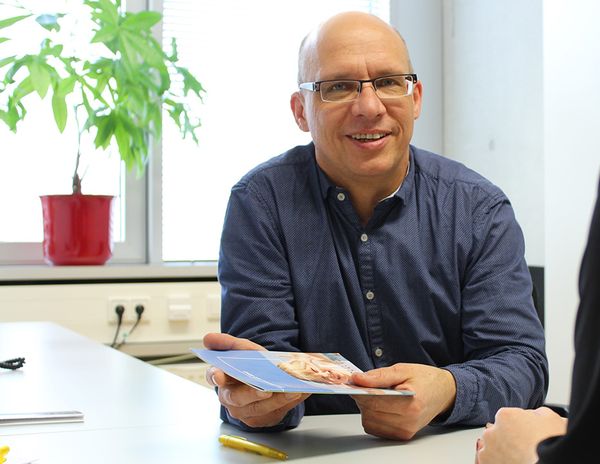
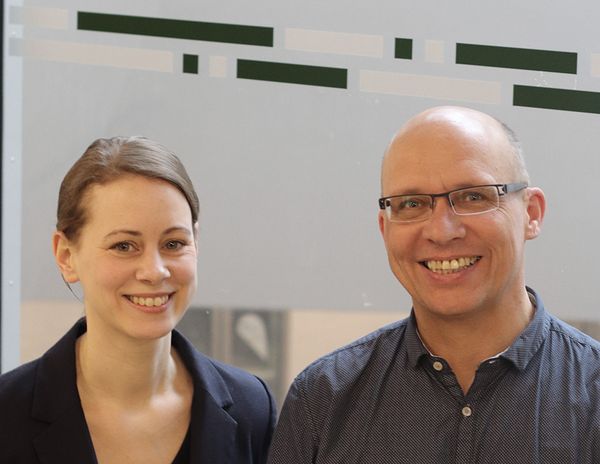
The Origins in Witzenhausen
Since its foundation in 1971, the Studierendenwerk Kassel has seen itself as a social organization for everyone, including foreign university members. But the international roots of the then Gesamthochschule Kassel (Comprehensive University) go back much further, and one of them can be found in Witzenhausen: Here, in 1899, the “Deutsche Kolonialschule” (German Colonial School) was founded in the buildings of a former Wilhelmite monastery with the aim of training tropical farmers as "development workers" for the German colonies of the time. After the Second World War, the Colonial School became the Engineering School for Tropical Farmers, which merged with the Gesamthochschule Kassel in 1970, attracting more and more students from Africa and Asia to o the small town in northern Hesse. Then, as now, finding affordable housing was a key issue for many of them. Thus, the Studierendenwerk Kassel managed the first student hall in Witzenhausen as early as 1973 and built another one in 1980.
Where should Erasmus live?
Inspired by the support of the European Union, the Studierendenwerk Kassel established a partnership with the University of Angers, France, in 1980. With the European Erasmus Exchange Program, founded in 1987, more and more students from other European countries come to Kassel. During the winter semester of 1993/94, 184 students already take part in this program - and the number is rising. A large number of them come from France, Great Britain and Italy.
Their demands bring new challenges: Where should the exchange students live? Usually, they only stay for one or two semesters. This is where the Studierendenwerk comes in. Together with the then Gesamthochschule Kassel (Comprehensive University), the Chamber of Industry and Commerce and the Chamber of Crafts, the Studierendenwerk launched the Europahaus project in 1995. This is a student housing complex on the largest campus, Holländischer Platz. In 32 apartments, students from other European countries in particular are accommodated. On the first floor, community rooms offer space for cultural events as well as for leisure activities. With the first students moving in, the first student hall tutor became active here in October 1996. In the 26 student halls, the principle of renting one third of the rooms to international students was applied from the beginning - today, over 50 percent of the rooms are allocated to international students from over 60 nations of the world.
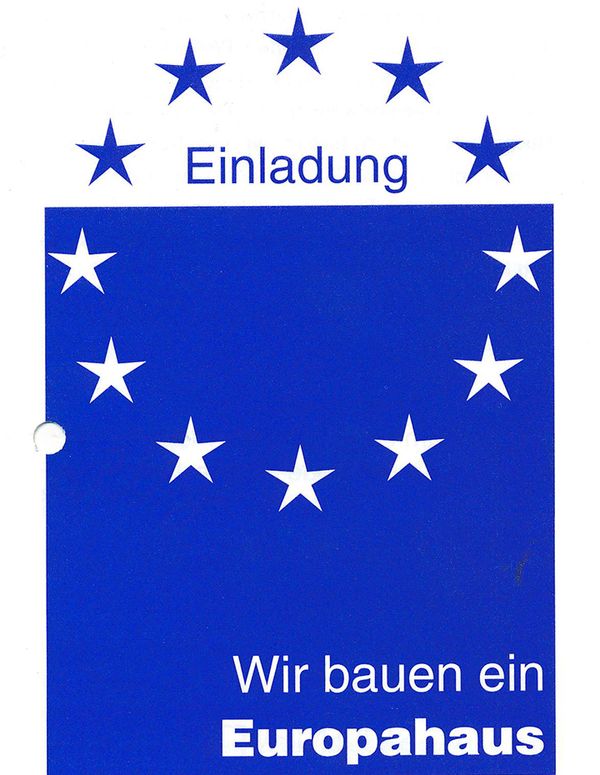
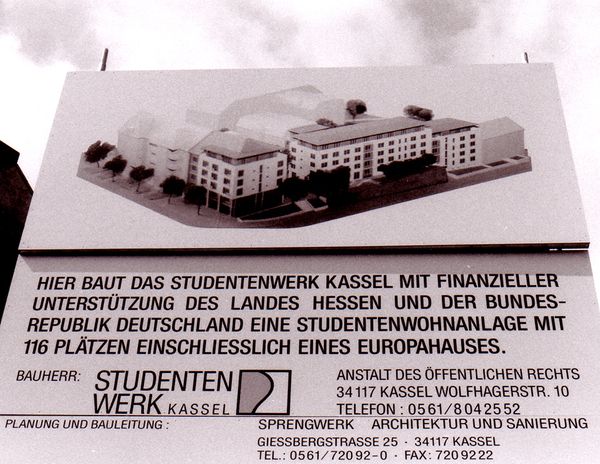
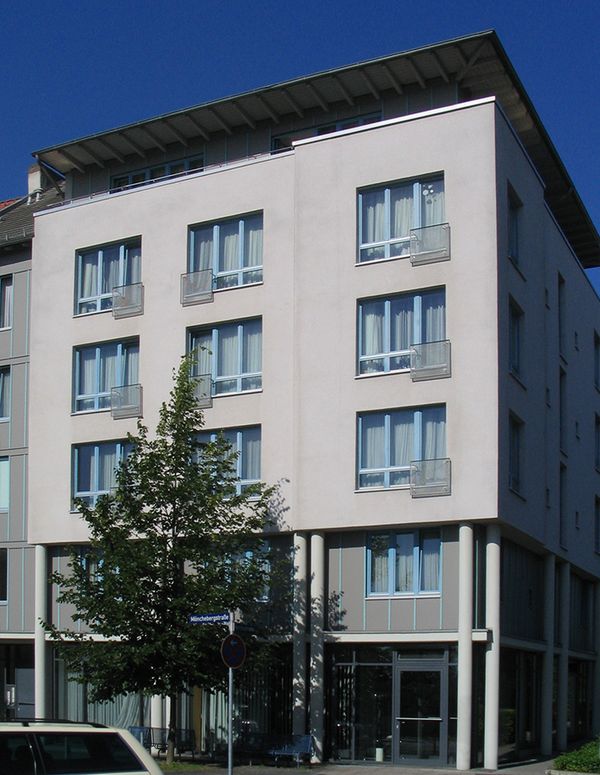
The International House
The globalized academic context not only brings exchange students to Kassel, but also visiting scholars. They, too, are looking for adequate temporary living space. To meet this need, the Studierendenwerk is building the "International House", the guest house for the University of Kassel, financed with subsidies from the federal and state government of Hesse, donations and loans. Since the winter semester 2000/2001, academic staff from abroad have been living here. The International Office of the University of Kassel organizes club evenings here and thus creates places for the encounter of cultures within the framework of concerts, talks and festivities.
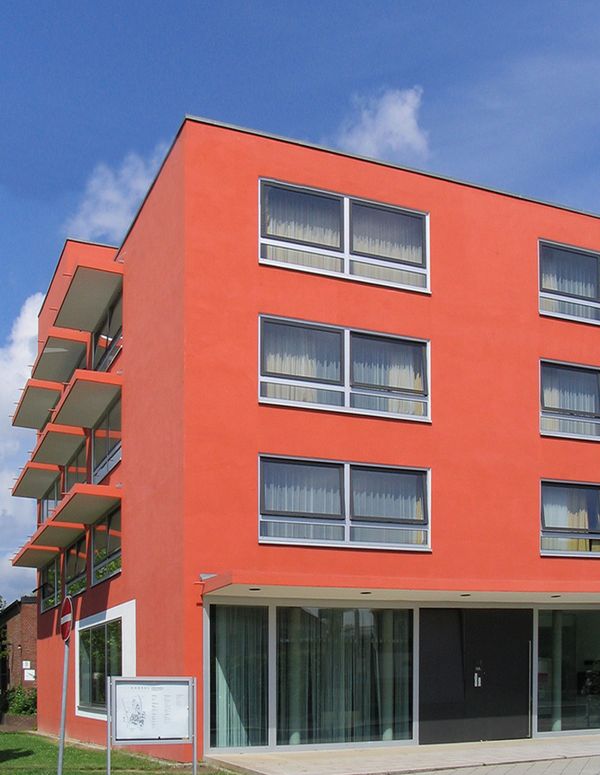
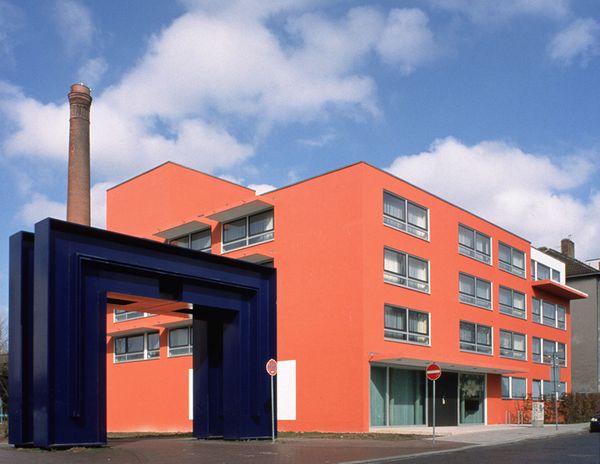
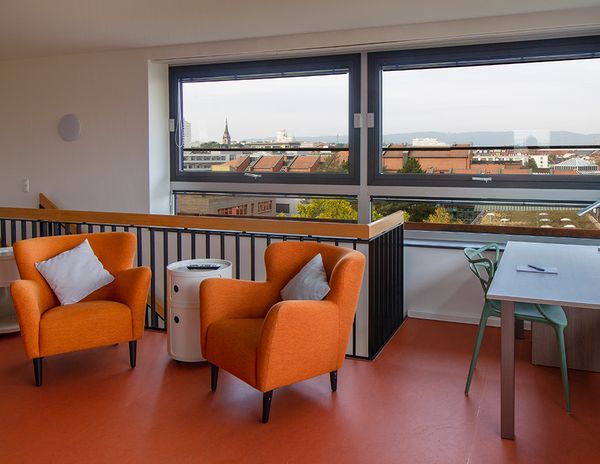
International Networking and Cultural Offerings
Since 2001, the Studierendenwerk has taken the increasing diversity as an opportunity to offer students in its student halls on-site contact persons. Tutors, most of them international students themselves, are there for their neighbors in the halls, look after new arrivals and ensure that residents connect more easily during joint leisure activities. This makes it easier for them to get started in their new city.
The program is so successful that in 2004, the Studierendenwerk set up its own meeting place not only for students: The CampusClub. In 2015, the CampusClub moves into the newly built Max Kade Haus, whose construction was supported by donations from the Max Kade Foundation. The foundation's motto is "Sowing the seeds of friendship where there had been enmity" - and it promotes encounters between students across national borders. https://max-kade-haus.de
Another cultural exchange is launched in 2013 in cooperation with the International Office of the University of Kassel: Twice a year, the Studierendenwerk and the University's Welcome Centre invite students to the International Dinner - a culinary trip around the world, where they can offer delicious dishes from their home countries. The dining halls and cafeterias are also international - with menus bringing global diversity to the plates. In 2010, the Café International opens - a cooperative project with the International Language Center.
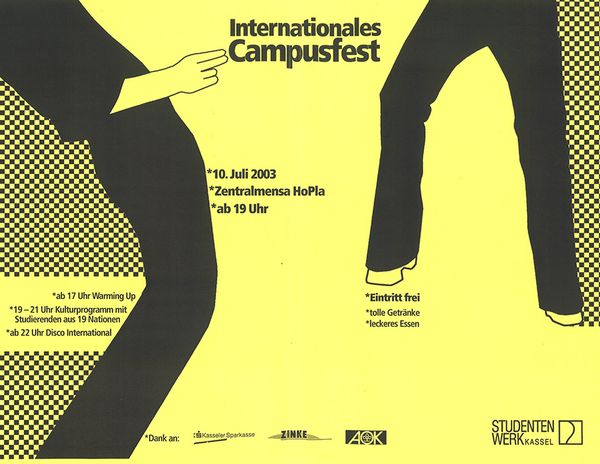
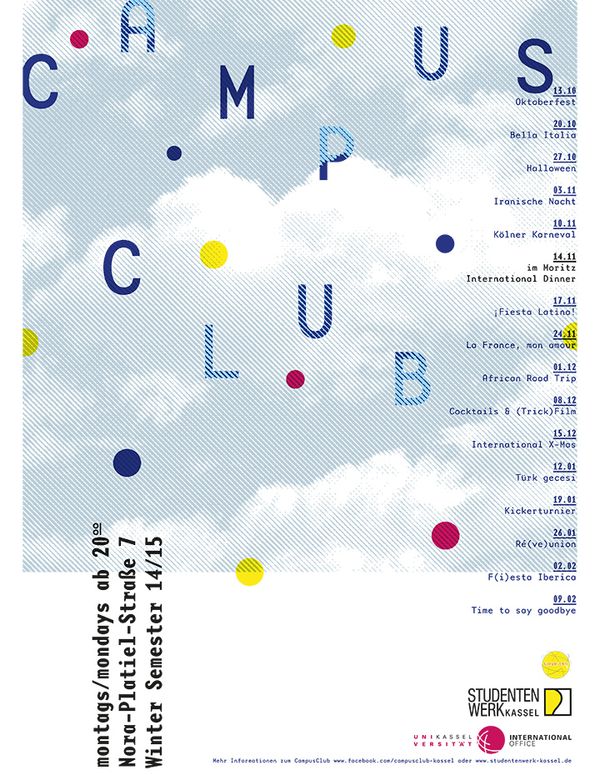
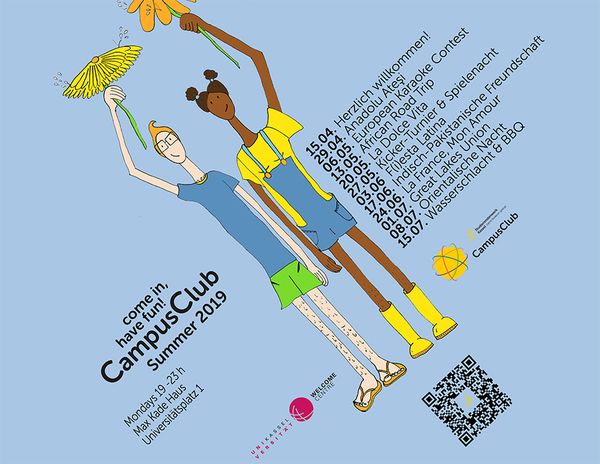
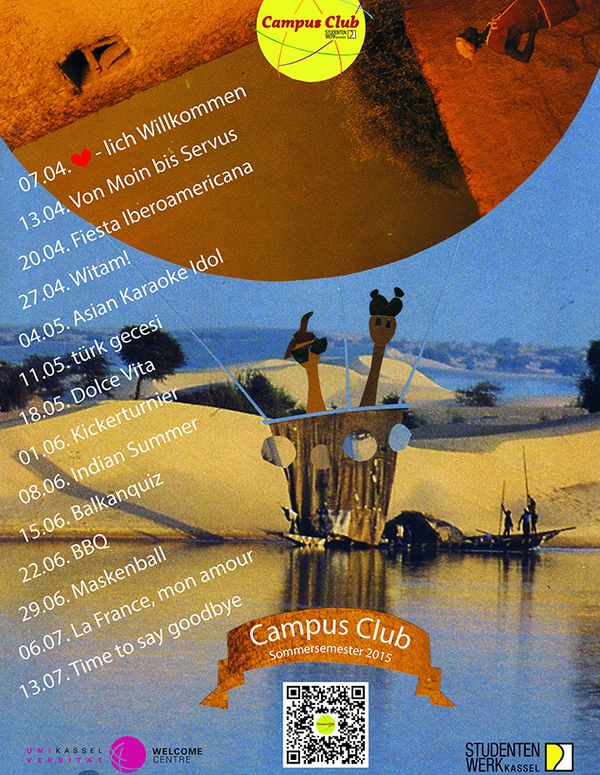
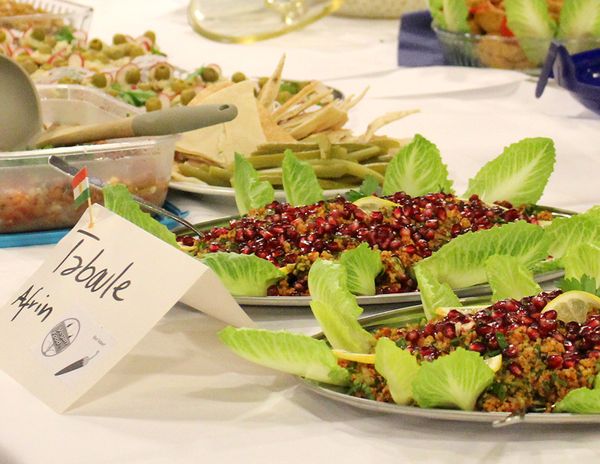
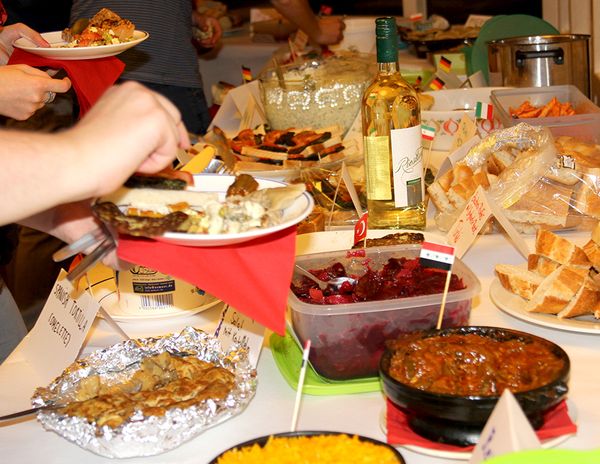
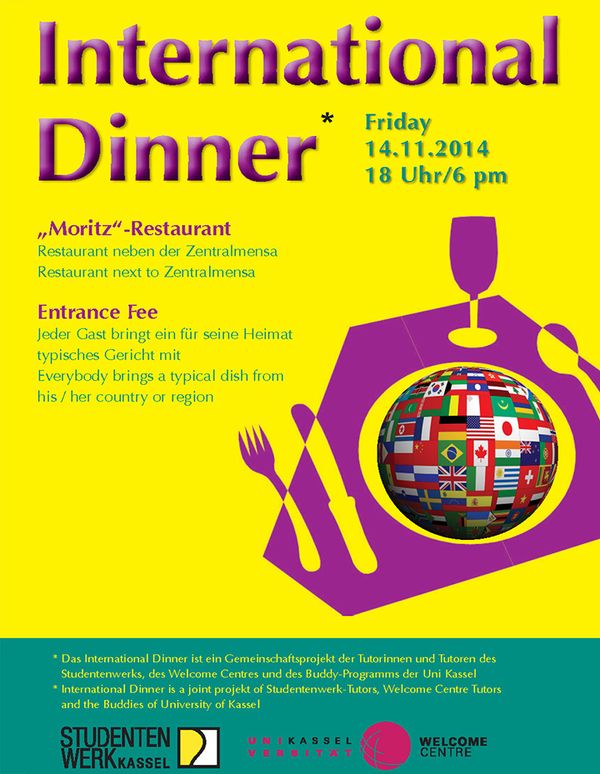

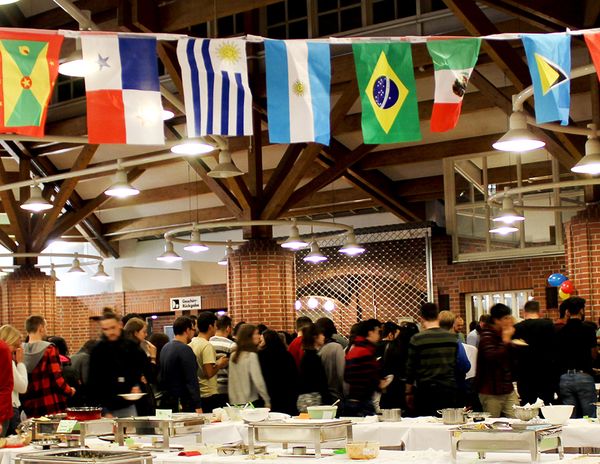
CampusClub - for students from all over the world
Nice people, music, karaoke, foosball or simply a cozy get-together with students from all over the world - that is the CampusClub of the Studierendenwerk. Volunteer tutors prepare the intercultural CampusClub evenings on behalf of the Studierendenwerk and in the best cooperation with the Welcome Centre of the International Office of the University of Kassel. Tutor Christoph introduces the CampusClub in the video.
Internationalization progresses
Internationalization is also visible in other areas of the Studierendenwerk's work. For example, a good 30 percent of the students who talk to the Social Advisors are internationals. In the daycare centers, many children have international roots – about 70 percent at HoPla-Kinderhaus, and at studykidscare even 89 percent.
Since around 2012, Studierendenwerk has been working hard to include non-German-speaking students in all services. Most documents, applications, signs, menus and notices are available in English and German.
The Studierendenwerk takes into account the needs of students from all over the world with special advisory services, creates housing, provides culinary diversity - and thus supports the internationalization goals of the University of Kassel.
